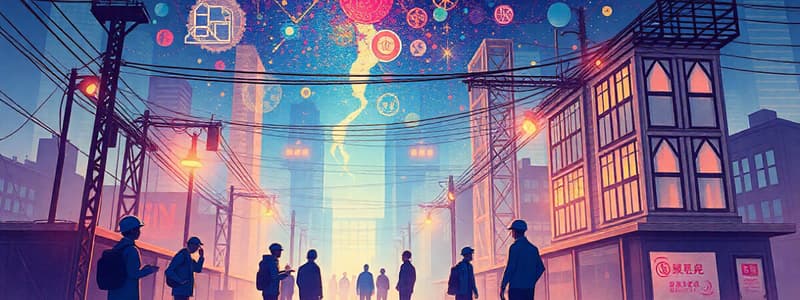Podcast
Questions and Answers
What is the primary reason children often enter the same occupations as their parents?
What is the primary reason children often enter the same occupations as their parents?
Which factor is NOT typically associated with increased job satisfaction?
Which factor is NOT typically associated with increased job satisfaction?
Which theoretical perspective emphasizes the importance of stratification for maintaining stability in society?
Which theoretical perspective emphasizes the importance of stratification for maintaining stability in society?
According to research, what significantly affects job satisfaction negatively?
According to research, what significantly affects job satisfaction negatively?
Signup and view all the answers
What does career socialization primarily involve?
What does career socialization primarily involve?
Signup and view all the answers
What is the primary function of an economy in sociology?
What is the primary function of an economy in sociology?
Signup and view all the answers
What characterizes mechanical solidarity according to Émile Durkheim?
What characterizes mechanical solidarity according to Émile Durkheim?
Signup and view all the answers
Which statement best describes workforce polarization?
Which statement best describes workforce polarization?
Signup and view all the answers
What is the primary goal of outsourcing for companies?
What is the primary goal of outsourcing for companies?
Signup and view all the answers
What does the term meritocracy imply in a class system?
What does the term meritocracy imply in a class system?
Signup and view all the answers
How does automation impact the workforce?
How does automation impact the workforce?
Signup and view all the answers
Why is the American Dream often difficult to achieve?
Why is the American Dream often difficult to achieve?
Signup and view all the answers
What type of solidarity is evident in advanced economies like the U.S.?
What type of solidarity is evident in advanced economies like the U.S.?
Signup and view all the answers
What is the primary distinction between relative and absolute poverty?
What is the primary distinction between relative and absolute poverty?
Signup and view all the answers
How does structural unemployment occur?
How does structural unemployment occur?
Signup and view all the answers
What defines the cycle of poverty?
What defines the cycle of poverty?
Signup and view all the answers
What is a key consequence of underemployment?
What is a key consequence of underemployment?
Signup and view all the answers
What does the Davis-Moore Thesis primarily argue?
What does the Davis-Moore Thesis primarily argue?
Signup and view all the answers
What does the Conflict Perspective view as the main issue in the economy?
What does the Conflict Perspective view as the main issue in the economy?
Signup and view all the answers
Which of the following is an example of the 'working poor' phenomenon?
Which of the following is an example of the 'working poor' phenomenon?
Signup and view all the answers
What is a potential cause of job mismatch?
What is a potential cause of job mismatch?
Signup and view all the answers
Which economic phase does inflation represent?
Which economic phase does inflation represent?
Signup and view all the answers
Which factor contributes to the concept of structural unemployment?
Which factor contributes to the concept of structural unemployment?
Signup and view all the answers
What does the Symbolic Interactionist Perspective focus on in economic contexts?
What does the Symbolic Interactionist Perspective focus on in economic contexts?
Signup and view all the answers
What often perpetuates the cycle of poverty?
What often perpetuates the cycle of poverty?
Signup and view all the answers
During which economic phase do governments typically intervene to prevent depression?
During which economic phase do governments typically intervene to prevent depression?
Signup and view all the answers
What does the term 'working poor' signify in the context of employment?
What does the term 'working poor' signify in the context of employment?
Signup and view all the answers
Study Notes
Economic Systems and Concepts
- Economy (Sociology): A social institution organizing resource exchange and management. It encompasses production, distribution, and exchange of needed/wanted resources (food, clothing, shelter, services) using money.
Early Economies
- Barter: Direct exchange of goods/services without money (e.g., milk for eggs).
Émile Durkheim's Solidarity Types
- Mechanical Solidarity: Simpler societies; cohesion through shared work, religion, and education.
- Organic Solidarity: Complex societies (e.g., US); cohesion through interdependence and specialized roles.
The American Dream and Economic Reality
- American Dream: The belief that hard work leads to success, often hindered by structural barriers, particularly during economic downturns.
Workforce Polarization
- Workforce Polarization: Job opportunities concentrate at high-skill and low-skill ends, with fewer mid-level roles.
- Outsourcing: Companies hire workers in other countries for lower wages to save money.
- Automation: Technology replaces human labor, causing job loss in some sectors.
Class System and Meritocracy
- Class System: Economic hierarchy allowing for theoretical movement based on merit.
- Meritocracy: System rewarding skill and hard work; social capital (connections, education) can heavily influence access to higher-paying jobs.
Gender, Immigration, and the Workforce
- Women's Workforce Participation: Increasing numbers of women in workforce roles, despite persistent gender wage gaps.
- Immigration: Immigrants fill diverse job roles (high-skill to low-skill), significantly impacting the US economy.
Poverty and Inequality
- Relative Poverty: Living below the average standard of living in a country.
- Absolute Poverty: Inability to afford basic needs, more prevalent in developing countries.
- Underemployment: Having a job that doesn't fully utilize skills, education, or experience (e.g., job mismatch, part-time work).
Structural Unemployment
- Structural Unemployment: Job seekers face a lack of matching jobs due to economic changes, technology adoption, or required skills.
- Skill/Location Mismatch: Available jobs lack matching skills or are located far from residents.
The Working Poor
- Working Poor: Employed individuals or job seekers earning insufficient income to escape poverty.
- Causes: Part-time work, low wages, lack of higher education and specialized skills.
Cycle of Poverty
- Cycle of Poverty: Limited access to education and resources trap individuals, hindering upward mobility.
- Causes: Limited access to quality education, inadequate resources (housing, healthcare, financial support), and difficulty finding stable employment.
Theoretical Perspectives on the Economy
Functionalist Perspective
- View: Economy as an efficient machine for societal stability, ensuring goods/service distribution.
- Davis-Moore Thesis (1945): Social stratification (inequality) is necessary to motivate skilled individuals to fill critical roles.
- Economic Stability: A strong economy provides necessary goods/services (e.g., efficient agriculture and transportation).
- Dysfunctions: Economic disruptions (e.g., recessions) disrupt social systems.
- Market Cycles: Surplus, inflation, recession - government interventions (adjusting interest rates) to prevent prolonged economic downturns.
Conflict Perspective
- View: Economy breeds inequality and exploitation, notably in capitalist systems.
- Class Struggle: The bourgeoisie (ruling class) gains from exploiting the proletariat (working class). Marginalization of dependents (elderly, disabled) occurs.
- Wealth Inequality: Critiques concentration of wealth among a few - e.g., top 20% holding 90% US wealth.
- Historical Movements: Social and political movements addressing inequality, like Occupy Wall Street.
Symbolic Interactionist Perspective
- View: Micro-level interactions and socially constructed economic realities are key.
- Career Inheritance: Children often follow parents' career paths due to learned values and familiar options.
- Career Socialization: Learning profession norms, values, and skills through family, education, and work environment.
- Job Satisfaction: Factors contributing to satisfaction encompass control/decision-making, freedom, and perceived importance to an organization.
- Research Findings: Workers are happiest when valued and empowered, suggesting that stress, risk, and vulnerability affect job satisfaction.
Studying That Suits You
Use AI to generate personalized quizzes and flashcards to suit your learning preferences.
Description
Explore the dynamics of economic systems and the concepts that shape them. This quiz delves into early economies like barter, Durkheim's solidarity types, and the complexities of the American Dream in today's polarized workforce. Test your understanding of how these concepts interact in modern society.




